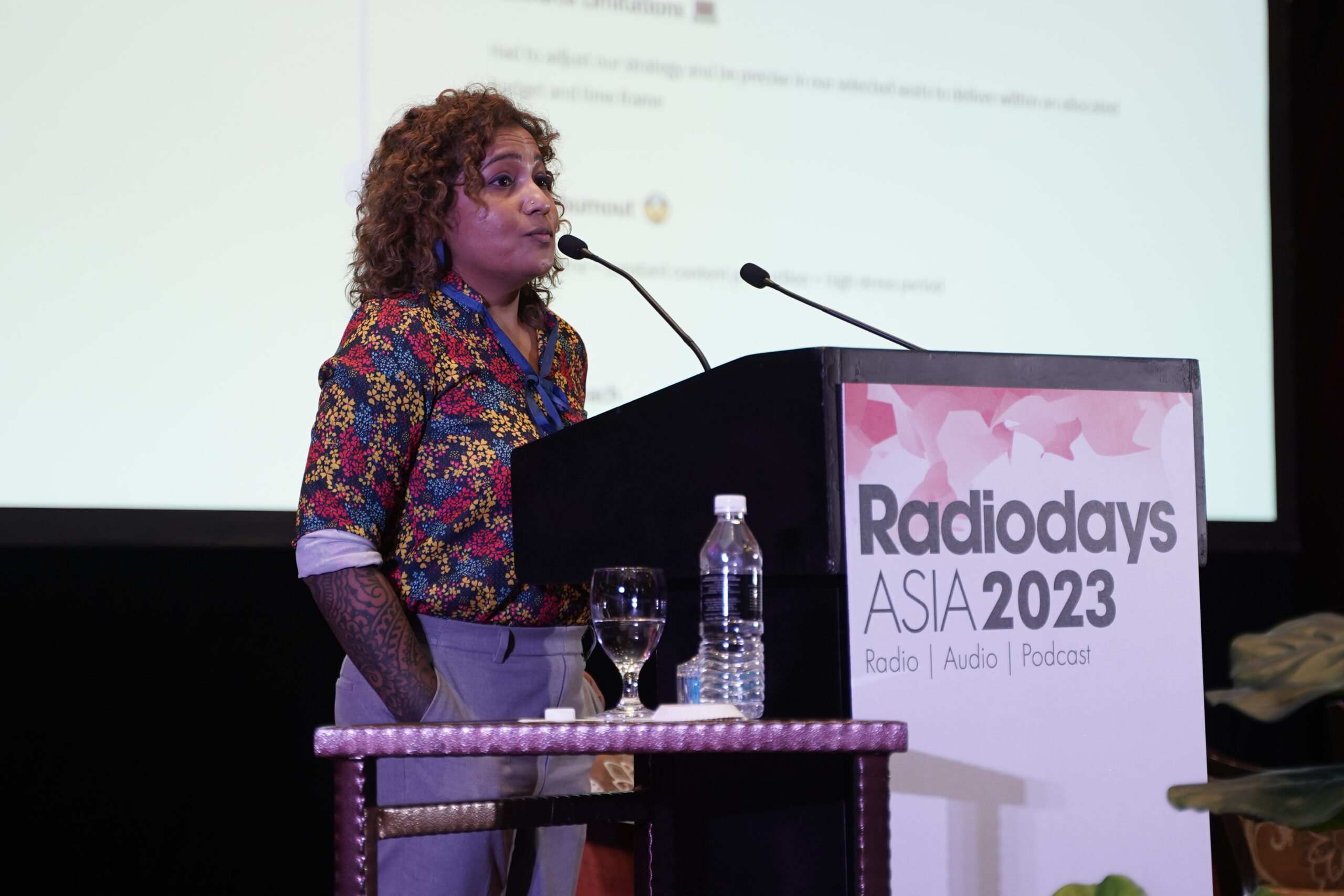Podcasts: How they complement the news
11th September 2023
At Radiodays Asia 2023, the Public Media Alliance organised a session examining how news media are using podcasts to provide extra context and in-depth analysis for audiences.

Whether it’s a daily episode encompassing the biggest story of the day – such as the BBC’s Newscast or RNZ’s The Detail – or a series focussing on a single story – such as Ukrainecast or the ABC’s Coronacast – podcasts are now an essential and established part of a public broadcaster’s response to news.
So why are podcasts now so valuable for public media, and what sort of service do they provide to audiences?
This was the subject of a session organised by the Public Media Alliance for the Radiodays Asia conference held in Kuala Lumpur in September 2023, with participants from the news division of the BBC, from Ukraine’s public broadcaster, Suspilne, and from the Malaysian digital media company, Between the Lines.
Here are some of the main points made by presenters during the session:
1. Podcasts can be set up quickly.
The first time the BBC considered establishing Ukrainecast was 48 hours before the war, as BBC News producers, Sam Bonham and Jonathan Aspinwall explained. Two days later, and the first episode was published, complete with logo, music, presenters, and everything else that goes into the development of a podcast. It was seven days from when Between the Lines (BTL) was first approached by Dr. Bridget Welsh to produce their 2023 election podcast, Bridget’s Kerusi Panas to the series being released.
Podcasts often take weeks and months to be launched, but the experiences outlined by both the BBC and BTL demonstrated that – although stressful at the time – podcasts can be launched at relatively short notice. This means as a medium, it can be flexible and deployed urgently to respond to breaking news stories, which demand a podcast for additional context.
This conversation was recorded for the Radiodays Asia conference, held in Kuala Lumpur on 5-6 September. Our thanks to Radiodays Asia and Sam and Jonathan for allowing us to republish this discussion.
2. Having the right talent to present the podcast is vital.
Victoria Derbyshire was one of the first calls for leading Ukrainecast. Having presented her own programme, not only was she an experienced and recognisable name to front the podcast, but her style and emotional intelligence meant she was perfect for a podcast which would require enormous sensitivity. Effort was also put into getting the right balance of the other presenters. Vitaly Shevchenko’s involvement was credited for Ukrainecast’s success, as it provided audiences with a direct link to the conflict. Meanwhile, Gabriel Gatehouse brought in podcast-knowhow and regional expertise.
Choosing the right presenter requires an understanding of how the podcast is going to feel and be styled before the recording has even started. Yet its importance to the success of a podcast is unrivalled. Similarly, the CEO of Trident Media and BTL, Darshini Kandasamy, said that Dr. Welsh – who led Bridget’s Kerusi Panas – had name recognition, and was a trusted person to tell political stories.
3. It can open your content up to different audiences.

Prior to their election podcast, Between the Lines produced a daily newsletter, which had a loyal following. This foray into podcasting provided two opportunities: firstly, it allowed them to tell a different type of story, which was not being covered by other media; and secondly, they were able to expose themselves to a different market.
Podcasts have undoubtedly democratised the audio market. Audio creators are no longer dependent on radio networks for airtime, nor bound by schedules. Instead, there is an opportunity for different types of media organisations – print, digital, and broadcast – to expand their offering in audio. In embracing this opportunity, media companies can expand their own coverage, explore different ways of storytelling, add additional context, and reach a new audience as well.
There is also a media freedom perspective. In being distributed digitally, the Supervisory Board Member for Ukraine’s public broadcaster, Vadym Miskyi, said podcasts have remained accessible to Ukrainian audiences in Russian-held territory. This means Suspilne is still reaching and serving audiences currently under Russian control. This benefit has also been seen in other countries where media is strictly censored, such as in Myanmar.
Listen toour podcast
Uncovering and exploring the biggest
issues facing public media
4. Podcasts allow media companies to explore different and otherwise untouched themes and subjects within a story.
This is one of the most exciting features of podcasts: they can be used as a complementary medium to provide news and analysis to audiences, with more angles, themes, and related stories. Podcasts do not need to rely on the news cycle or agenda and can instead feature just one topic and explore it in depth. This is a feature of Ukrainecast, which in some episodes, will often look at a particular niche related to the war. This carries a benefit to audiences, who have more information within their reach, while also benefitting the rest of the media company, freeing other departments to focus on other priorities.

Suspilne’s Russian Fake podcast similarly focusses on just one aspect of the war. Its narrow brief ensures the podcast is targeted and retains maximum value and can also be a location which audiences can turn to for the specific issue of Russian propaganda. 25 percent of Suspilne’s podcasts are about the war, and so when viewed collectively, Suspilne provides comprehensive coverage.
5. Collaboration can be invaluable.
Russian Fake would not have been possible without the involvement of Detector Media – a Ukraine-based NGO. Bridget’s Kerusi Panas would not have been possible without Dr. Welsh driving the production.
More and more, media companies are turning to new partners to develop podcasts. Recent examples include Vikings, a Swedish Radio production which is translated and broadcast by NRK, DR, and Radio-Canada. Or Stuff the British Stole, an ABC podcast, which is now being co-produced by CBC/Radio-Canada.
Collaborations provide even more opportunities for podcast producers, exposing organisations to new audiences, offering new learning and development opportunities, and ensuring the ongoing creation of quality content. As funding for media companies – both public and private – becomes more precarious, collaborations will only become more vital.

Related Posts
28th July 2023
PMA & DW Akademie partner for PodcasTraining Workshop
Public Media Alliance members are…
19th August 2022
Podcast Collaborations: The positives, the pitfalls, and the public interest
Top podcast executives discuss the…
30th May 2022
Front lines and online: New podcast explores the dangers facing journalists today
Episode 4 of PMA’s podcast explores the…
21st April 2022
Ukraine war: Public media podcasts with unique takes
From an open API to practical info for…




